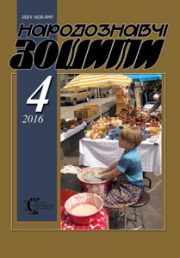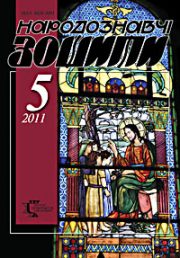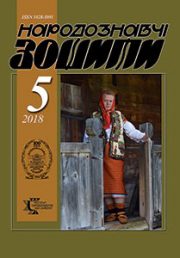The Ethnology Notebooks. 2019, 1 (145), 142—148
UDK 785.1 +78.03
DOI https://doi.org/10.15407/nz2019.01.142
VICTOR VLASOV’S WORKS IN THE REPERTOIRE OF THE ENSEMBLE OF BANDURA PLAYERS «CHARIVNITSI»
BEREZUTSKA Maryna
ORCID ID: https://orcid.org/0000-0002-5511-2195
Аsistant professor
Department of Folk Instruments
Glinka Dnipropetrovsk Academy of Music,
10 Livarna Str., 49044, Dnipro, Ukraine.
Contacts: e-mail: bermarser@ua.fm
Abstrakt. Ensemble of bandura players «Charivnitsi» M. Glinka Dnipropetrovsk Academy of Music is a living example of Ukrainian musical culture, its repertoire reflects the development of all ensemble bandura performance. The repertoire of the ensemble «Charivnitsi» includes musical mixture of various styles and trends, genres and forms. These are Ukrainian folk songs, works of foreign and domestic composers-classics, contemporary Ukrainian composers. Problem Statement. An important role in the development of any musical instrument plays the original repertoire created by the composers for this instrument only. Victor Vlasov’s оriginal works for bandura have a special place in the ensemble’s repertoire. A modern Odessa composer Victor Vlasov combined the unique timbre of bandura, poems of Ukrainian poets, contemporary means of musical expressiveness. Purpose. To analyze the works of V. Vlasov in the repertoire of the ensemble of bandura players «Charivnitsi» of M. Glinka Dnipropetrovsk Academy of Music, to find out the individual peculiarities of composer style in the original works bandura, to determine the role and significance of Vlasov’s works in the context of the problem of the bandura ensemble repertoire. Methods. The methodological basis of research comprises methods of system historical and musicological art analysis based on the principles of comprehensiveness and consistency. Results, Conclusion. The V. Vlasov’s works for bandura is a separate layer of the bandura repertoire, which is distinguished by the new approach of the modern composer to the national musical instrument. The composer masterfully used the timbre-acoustic properties of bandura in new original works, which made them hits of bandura performance and at the same time an integral part of the bandura’s concert and pedagogical repertoire.
Keywords: ensemble of bandura players, original repertoire for bandura, composer V. Vlasov.
Received 6.12.2018
REFERENCES
Мorozevich, N.V. (2017). Bandura creativity of V. Vlasov in the modern musical culture of Ukraine. Bandura Art of the 21st Century: Trends and Prospects for Development: (Proceedings of the II International Scientific Conference, Kyiv, 2006). Kyiv [in Ukrainian].
Ivanitsky, A.I. (2004). Ukrainian folk music. Vinnitsa: Nova Knyha [in Ukrainian].
Shevchenko, T.G. (2003). Complete collection of works in 12 volumes. Kyiv: Naukova Dumka [in Ukrainian].
Yatsenko, M. (Еd.). (1996). The history of Ukrainian literature of the XIX century: in 3 volumes. (Vol. 2): 40—60’s of the nineteenth century. Kyiv:Lybid [in Ukrainian].
Eisenstok, I.Y. (Еd.). (1976). Shevchenko dictionary in two volumes. (Vol. 1). Kyiv: Naukova Dumka [in Ukrainian].
Lanovik, M.B., Lanovik, Z.B. (2006). Ukrainian oral folk art. Kyiv: Znannya-Pres [in Ukrainian].






